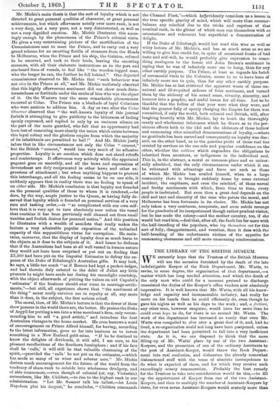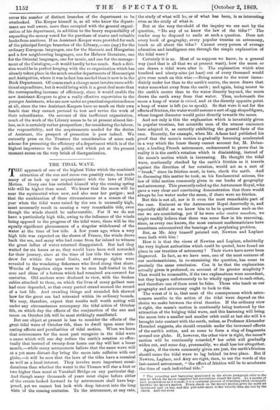THE LIBRARY OF THE BRITISH MUSEUM.
WE earnestly hope that the Trustees of the British Museum will use the occasion furnished by the death of the late indefatigable Keeper of the Book Department, Mr. Watts, to revise, in some degree, the organization of that department,—a matter which has long needed attention, and which the death of the only man who could for a moment pretend to discharge unassisted the duties of the Keeper's office renders now absolutely imperative. It is well known that Mr. Watts, with all his know- ledge and capacity and immeasurable industry, had really far more on his hands than he could efficiently do, even though he gave his nights as well as his days to the work ; and, a fortiori, any other man, however sanguine, would have far more than he could even hope to do, for there is no second Mr. Watts. The work of the department has increased so vastly that even Mr. Watts was compelled to slur over a great deal of it, and, had he lived, a re-organization could not long have been postponed, unless the department had been permitted to fall into a very inefficient state. As it is, we are disposed to think that the mere filling-up of Mr. Watts' place by one of the two Assistant- Keepers, and the promotion of one of the ordinary Assistants to the post of Assistant-Keeper, would throw the Book Depart- ment into real confusion, and dishearten the already somewhat disheartened staff with the sense of absolute incompetence to do what is expected of them, and for which they receive such exceedingly scanty remuneration. Probably the best remedy for the Trustees to take into consideration would be this,—to fill up the appointment of Keeper from one of the two Assistant- Keepers, and then to multiply the number of Assistant-Keepers by three, for even seven Assistant-Keepers would scarcely more than
cover the number of distinct branches of the department to be overlooked. The Keeper himself is, as all who know the depart- ment are well aware, more than occupied with the general organi- zation of his department, in addition to the heavy responsibility of expending the money voted for the purchase of scarce and valuable books from auctions. If an Assistant-Keeper were provided for each of the principal foreign branches of the Library,—one (say) for the ordinary European languages, one for the Slavonic and Hungarian and a few neighbouring languages, one for Hebrew literature, one for the Oriental languages, one for music, and one for the manage- ment of the Catalogue,—it would hardly be too much. Such a divi- sion would be in perfect keeping with the re-organization which has already taken place in the much smaller departments of Manuscripts and Antiquities, where it was in fact less needed than it now is in the Book Department. Of course such a change must involve some addi- tional expenditure, but it would bring with it a great deal more than the corresponding increase of efficiency, since it would enable the new Assistant-Keepers to give a really effective supervision to the younger Assistants, who are now under no practical superintendence at all, since the two Assistant-Keepers have so much on their own hands that they cannot pretend to test and revise the work of their subordinates. On account of this inefficient organization, much of the work of the Library seems to be at present almost list- less, as it is certainly rather prospectless ; for considering the labour, the responsibility, and the acquirements needed for the duties of Assistant, the prospect of promotion is poor indeed. We earnestly press on the Trustees the consideration of some such scheme for promoting the efficiency of a department which is of the highest importance to the public, and which yet at the present moment seems on the very brink of disorganization.































 Previous page
Previous page